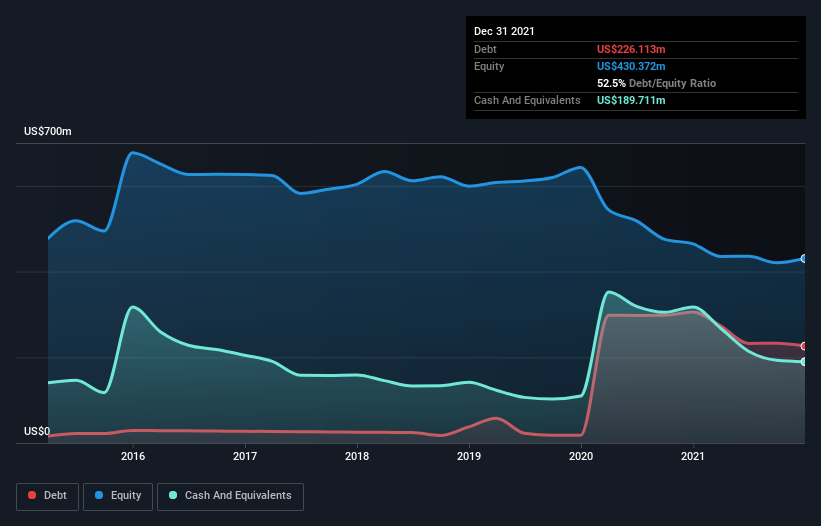
Warren Buffett famously said, 'Volatility is far from synonymous with risk.' It's only natural to consider a company's balance sheet when you examine how risky it is, since debt is often involved when a business collapses. Importantly, IMAX Corporation (NYSE:IMAX) does carry debt. But is this debt a concern to shareholders?
What Risk Does Debt Bring?
Debt assists a business until the business has trouble paying it off, either with new capital or with free cash flow. In the worst case scenario, a company can go bankrupt if it cannot pay its creditors. However, a more frequent (but still costly) occurrence is where a company must issue shares at bargain-basement prices, permanently diluting shareholders, just to shore up its balance sheet. Of course, the upside of debt is that it often represents cheap capital, especially when it replaces dilution in a company with the ability to reinvest at high rates of return. When we think about a company's use of debt, we first look at cash and debt together.
View our latest analysis for IMAX
How Much Debt Does IMAX Carry?
You can click the graphic below for the historical numbers, but it shows that IMAX had US$226.1m of debt in December 2021, down from US$305.7m, one year before. However, it does have US$189.7m in cash offsetting this, leading to net debt of about US$36.4m.

How Healthy Is IMAX's Balance Sheet?
According to the last reported balance sheet, IMAX had liabilities of US$110.3m due within 12 months, and liabilities of US$342.5m due beyond 12 months. Offsetting these obligations, it had cash of US$189.7m as well as receivables valued at US$226.6m due within 12 months. So it has liabilities totalling US$36.6m more than its cash and near-term receivables, combined.
Given IMAX has a market capitalization of US$1.15b, it's hard to believe these liabilities pose much threat. However, we do think it is worth keeping an eye on its balance sheet strength, as it may change over time.
We use two main ratios to inform us about debt levels relative to earnings. The first is net debt divided by earnings before interest, tax, depreciation, and amortization (EBITDA), while the second is how many times its earnings before interest and tax (EBIT) covers its interest expense (or its interest cover, for short). This way, we consider both the absolute quantum of the debt, as well as the interest rates paid on it.
Given net debt is only 0.86 times EBITDA, it is initially surprising to see that IMAX's EBIT has low interest coverage of 1.1 times. So while we're not necessarily alarmed we think that its debt is far from trivial. We also note that IMAX improved its EBIT from a last year's loss to a positive US$5.3m. There's no doubt that we learn most about debt from the balance sheet. But ultimately the future profitability of the business will decide if IMAX can strengthen its balance sheet over time. So if you're focused on the future you can check out this free report showing analyst profit forecasts.
But our final consideration is also important, because a company cannot pay debt with paper profits; it needs cold hard cash. So it's worth checking how much of the earnings before interest and tax (EBIT) is backed by free cash flow. Over the last year, IMAX saw substantial negative free cash flow, in total. While that may be a result of expenditure for growth, it does make the debt far more risky.
Our View
Both IMAX's conversion of EBIT to free cash flow and its interest cover were discouraging. But its not so bad at managing its debt, based on its EBITDA,. Taking the abovementioned factors together we do think IMAX's debt poses some risks to the business. So while that leverage does boost returns on equity, we wouldn't really want to see it increase from here. The balance sheet is clearly the area to focus on when you are analysing debt. However, not all investment risk resides within the balance sheet - far from it. For instance, we've identified 1 warning sign for IMAX that you should be aware of.
If, after all that, you're more interested in a fast growing company with a rock-solid balance sheet, then check out our list of net cash growth stocks without delay.
New: AI Stock Screener & Alerts
Our new AI Stock Screener scans the market every day to uncover opportunities.
• Dividend Powerhouses (3%+ Yield)
• Undervalued Small Caps with Insider Buying
• High growth Tech and AI Companies
Or build your own from over 50 metrics.
Have feedback on this article? Concerned about the content? Get in touch with us directly. Alternatively, email editorial-team (at) simplywallst.com.
This article by Simply Wall St is general in nature. We provide commentary based on historical data and analyst forecasts only using an unbiased methodology and our articles are not intended to be financial advice. It does not constitute a recommendation to buy or sell any stock, and does not take account of your objectives, or your financial situation. We aim to bring you long-term focused analysis driven by fundamental data. Note that our analysis may not factor in the latest price-sensitive company announcements or qualitative material. Simply Wall St has no position in any stocks mentioned.
About NYSE:IMAX
IMAX
Operates as a technology platform for entertainment and events worldwide.
Adequate balance sheet with moderate growth potential.


